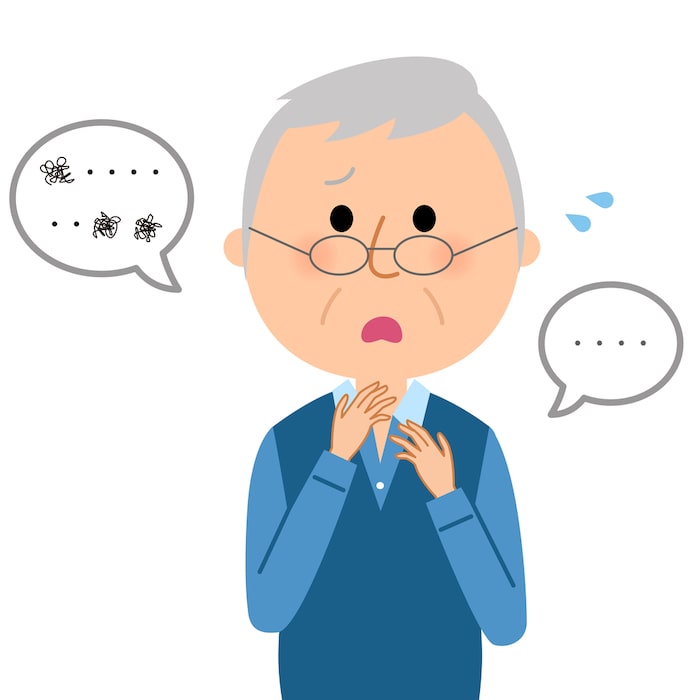What is Aphasia?
Aphasia is an acquired communication disorder due to brain damage that impacts one’s ability to comprehend and express language. While aphasia is often known to influence verbal language, it can concurrently impact one’s reading and writing ability.
Aphasia can affect people of all ages and is most often a result of a traumatic brain injury or stroke.

Symptoms of Aphasia
While aphasia is most often characterized as a loss of language, it is important to note that each individual experiences a varying severity and degree of aphasia. While some individuals express difficulty with word finding during conversation, others may experience a complete loss of verbal expression resulting in the use of an AAC.
Common signs of Aphasia:
- Difficulty naming objects, places, and events that are familiar
- Communicating with nonsense words (e.g. jargon)
- Speaking in single words or short phrases
- Unable to answer yes/no questions reliably
- Difficulty with understanding figurative language (sarcasm, idioms, etc.)
- Difficulty with comprehending what others are saying
- Difficulty with writing and copying letters
- Writing run-on sentences that have incorrect use of grammar
- Difficulty recognizing familiar words
While the symptoms above are a few signs of aphasia, follow our Aphasia page to learn more.
Aphasia Types
There are different types of aphasia with varying degrees of symptoms. It is possible for an individual to experience symptoms in multiple categories, pending where the brain damage took place.
Broca’s Aphasia (non-fluent and expressive aphasia)
- Effortful and straining speech that is limited to a few words
- Scrambled sentences with word substitutions
- Difficulties with writing (similar to speech)
Wernicke’s Aphasia (fluent and receptive aphasia)
With Wernicke’s aphasia, individuals can speak in long sentences with easy-flowing speech however the words and phrases often don’t make sense. Individuals are often unaware of their errors and have difficulty with comprehension of language.
- Fluent speech with normal prosody
- Speech may include neologisms (new words with no meaning)
- Writing and reading comprehension impaired
Anomic Aphasia
Anomic aphasia involves difficulty with word finding and naming items. Individuals with anomic aphasia often have fluent with grammatically correct sentences. However, they often experience difficulty with finding the right word and often utilize substitutions or descriptions to get their message across.
- Good comprehension of spoken language
- Occasional difficulty with writing and reading (similar to spoken language)
- Often able to communicate using strategies
Conduction Aphasia (Associative Aphasia)
With conduction aphasia, individuals have difficulty repeating words and/or phrases.
- Individuals are often aware of their errors but have difficulty self-correcting
- Good comprehension and spoken expression of language
- Rarely have difficulty with reading and writing
- May benefit from writing information versus repeating
Global Aphasia
Global aphasia involves deficits in all language modalities including verbal language, verbal comprehension, reading, and writing.
- Few words and/or no words spoken
- Difficulty with repetition of verbal language
- Difficulty with comprehension of language
- Unable to write and read
Primary Progressive Aphasia
While most aphasias are due to brain injury and/or stroke, primary progressive aphasia results from dementia and is a neurodegenerative disease.
Initially, primary progressive aphasia presents as a mild speech and language impairment in which individuals may experience occasional halting speech, inconsistent intonation or may produce fewer words.
As the disease progresses, however, individuals may be unable to produce language and experience severe comprehension deficits with reading and writing difficulties. Individuals will often experience memory loss.
Types of Primary Progressive Aphasia:
- Semantic– Difficulty with comprehension of language and naming items
- Nonfluent– Difficulty with expression of speech with reduction of words and halting speech with impaired grammar
- Logopenic– Difficulty with word-finding and repeating language
Mixed Transcortical Aphasia (Isolation Aphasia)
Mixed Transcortical Aphasia involves preservation of one’s ability to repeat language.
- Non-fluent speech with atypical prosody and intonation
- Echolalia/repetition of speech
- Difficulty with initiation and comprehension of speech
- Impaired reading and writing
How Can Speech Therapy Help with Aphasia?
Speech therapy is vital to the recovery process as it focuses on the restoration and rehabilitation of one’s communication skills. At Speak Therapy, all speech therapy is individualized and client-focused. With a speech language pathologist, assessment and treatment is collaborative and focuses on the client’s goals from speech therapy services.
If you or a loved one is experiencing any of the difficulties listed above, schedule a free consultation below.
